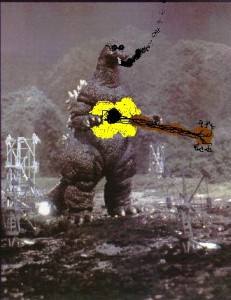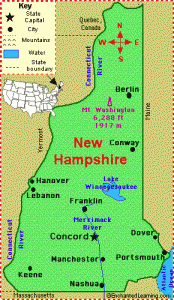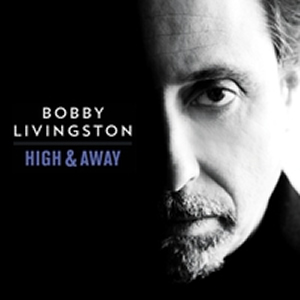 Covering the New England music scene as a music journalist is one of the most exciting and rewarding experiences any writer and music fan could ever dream of. I could write endlessly about the talent in our six state region and all of the exiting bands I’ve seen in all of the special venues I’ve visited. Sadly, there is one New England state that hasn’t yet gotten the memo that the New England music scene is a scene of professional musicians and music industry professionals. That would be my beloved home state of New Hampshire.
Covering the New England music scene as a music journalist is one of the most exciting and rewarding experiences any writer and music fan could ever dream of. I could write endlessly about the talent in our six state region and all of the exiting bands I’ve seen in all of the special venues I’ve visited. Sadly, there is one New England state that hasn’t yet gotten the memo that the New England music scene is a scene of professional musicians and music industry professionals. That would be my beloved home state of New Hampshire.
While I am usually seen as a vital colleague that musicians, promoters, radio station personnel need to work with professionally in other New England states, I’ve lost track of the number of times Granite State musicians have yelled at me, attempted to bully me, demanded coverage, and, in general, were just plain rude, unreasonable, and held unrealistic expectations as to what I can or cannot do for them.
Usually, when I hear from a musician in the other five New England states, I get an e-mail in which, if it’s the first contact, they make a polite introduction, tell me something about their accomplishments and achievements to convince me they’re newsworthy and that their music is something I might like to include in this zine. Then they usually conclude by writing they’d like to send me “a CD for consideration for a review.” Other times, they write something to the effect of “I’ve included links to my band’s music. If you’d like to attend any of our live shows, please let me know in advance which one you’d like to attend. I’d be happy to put you and a guest on our guest list.”
Unfortunately, only about half the people I deal with in New Hampshire would ever ask with that kind of mutual respect and professional courtesy. The other 50 percent, which I term in my mind “The Great Unwashed,” after a British rock scene expression, tend to feel they’re entitled to coverage. I usually feel that they see me as some kind of indentured servant who is at their beck and call. There is one singer-musician in a hard rock trio I’ve been familiar with since 2005. After performing a less than mediocre set at the now defunct Hogs Trough Saloon in Manchester back in 2005, he got excited when he found out I was writing for Boston-based publications like SoundCheck, Skope Magazine, and others. He immediately started to badger me for press coverage in those magazines. “Yeah, yeah, yeah. That’s good. I want you to start writing me up in those magazines,” he said. No matter how many times I told him I’d reserve judgment until I listened to the CD he shoved into my hands, he’d continue his near-chant about putting him in Boston-based music magazines. It would have been hysterical if it were not so obnoxious, presumptuous, and unprofessional. That young band hadn’t even made their name in their home state of New Hampshire and here’s their band leader demanding a write up in the Hub. A couple of years ago, this same musician-singer, still fronting that same mediocre hard rock trio, commented on my Facebook wall: “Hey, send me your address. I want you to review my new CD.”
Almost ten years later he still hasn’t learned that he’s not entitled to the coverage. That goes a long way toward explaining this issue of entitlement. About half the people I deal with in New Hampshire are still set in their ways. They grew up in small towns in which their local weekly newspapers catered to their every demand. Long before they became musicians, they grew up in a household in which their parents were calling up their local newspapers demanding coverage for their community theater plays, their bowling league championships, their beauty pageants. These calls to their local newspaper might be something to the effect of: “Hey, our bowling team is in the league championship for the first time in seven years. So make sure you do a front page story. If you can’t fit it all on the front page, you can just continue it on the front page of the sports section. Speaking of your sports section, we want your sports reporter to cover our bowling team just like he covers high school sports. No more tucking us away in the community news notes section.”
That may sound arrogant, but that is the way the bowling league person interpreted his relationship to his local pager. Tat’s just the way a lot of community oriented people relate to their local newspaper. I dealt with this attitude when I wrote for local newspapers in New Hampshire. Even when the community theater people neglected to send out a press release or even call the newspapers to inform about an upcoming production, they would still call the newspaper to yell at an editor for not covering their event. The problem with this kind of mindset is that it doesn’t translate well into New Hampshire’s music scene. New Hampshire’s music scene is no longer an informal community event like community theater plays, bowling leagues, and beauty pageants. It’s a profession, and has been for some time. A venue invests a few hundred dollars in a band on a given night hoping the band will help bring in $3,700 to $4,300 in food and beverage sales for the evening. Take a look in the local newspaper listings at the number of bars and restaurants in New Hampshire offering live music entertainment. There are quite a few now. That would make it a professional enterprise with a lot of money at stake. That also makes it something where bands should be earning their gigs, air plays, and press coverage, not a local matter in which small town big shots yell at people for not meeting their support needs. I’ve listened to bar owners complain about bands who call demanding a booking. Please, a bar owner is a business person. He or she would need to know if a band can bring in their own followers, appease the regulars with their song selections and presentation, and if they matched the age group, manner, and general vibe of the room. It is a business decision made by the person who owns and or manages the establishment or the room’s booking agent. Band leaders who think a forceful approach to dealing with owners, managers, and bookers are just being foolish. It’s a business, so they should talk numbers instead of just ringing the bars’ phone off the hook. Harassment won’t work.
 Getting back to my own experiences, from the music journalist’s point of view. A lot of times there’s an implied threat I receive from New Hampshire music scenesters. After telling me about a certain band they know or about an upcoming event they’re involved with, they often add, in an aggressive, edgy tone of voice, “I know you’re going to write a story about that, Bill,” intimating they’ll come down on me in some way if I don’t post an article on whatever it is they’re pushing on me. When people in the Granite State put someone on notice in this fashion, what they really mean is that they’re going to yell at the person who doesn’t follow through on their expectation. A lot of people up here see themselves as a force to be reckoned with because they perceive themselves as possessing monster size strong personalities. They think if they yell at someone, the person will disintegrate, crumble to dust under the might of their forceful personalities. Of course, most of us know that’s only effective if the person they’re harassing is very timid. If the person they’re after also has a backbone and a mouth, it turns into something loud, obnoxious, distracting to others, and just plain foolish. I’ve been a journalist for 30 years now. It’s not like I’ve never been yelled at before. Send me a link to your music, people. Harassing me at a venue won’t get you an article.
Getting back to my own experiences, from the music journalist’s point of view. A lot of times there’s an implied threat I receive from New Hampshire music scenesters. After telling me about a certain band they know or about an upcoming event they’re involved with, they often add, in an aggressive, edgy tone of voice, “I know you’re going to write a story about that, Bill,” intimating they’ll come down on me in some way if I don’t post an article on whatever it is they’re pushing on me. When people in the Granite State put someone on notice in this fashion, what they really mean is that they’re going to yell at the person who doesn’t follow through on their expectation. A lot of people up here see themselves as a force to be reckoned with because they perceive themselves as possessing monster size strong personalities. They think if they yell at someone, the person will disintegrate, crumble to dust under the might of their forceful personalities. Of course, most of us know that’s only effective if the person they’re harassing is very timid. If the person they’re after also has a backbone and a mouth, it turns into something loud, obnoxious, distracting to others, and just plain foolish. I’ve been a journalist for 30 years now. It’s not like I’ve never been yelled at before. Send me a link to your music, people. Harassing me at a venue won’t get you an article.
It is oh so intellectually retarded to demand coverage. I know that I don’t sit myself down at my computer and start the long arduous process of researching an artist, formulating questions, conducting a lengthy interview, painstakingly typing the entire interview and other notes into the computer, shaping and shifting that text into an article, then finally self-editing, until I’m convinced an artist is newsworthy and talented. I generally don’t take on that huge volume of work simply because someone with a strong sense of his or her self-importance in his or her community marched up to me and demanded an article or played some other kind of pushy game.
Sometimes, the music press in New Hampshire can be a part of the problem. There is a lady located near Keene who publishes a pamphlet every other month about her favorite genre. She has a strange perception of her relationship to her advertisers. She demands that they pay for ads that she muffed up, listing the wrong band in the wrong room and or other mistakes that make some of her ads defeat the purpose of advertising. Traditionally, a publication would apologize for an error in an advertisement and waive the invoice for the issue in which the error occurred. Not this lady. She gives them quite a fight over the phone to get her invoice paid. I think she has a such a strong sense of her own self-importance in her community she lives in, that she fails to recognize it doesn’t translate to her role of publisher and fails to recognize that she works for the advertiser, not the other way around.
 I have another anecdote to share about the two different attitudes in New Hampshire. It took place at a popular Sunday afternoon blues jam. A regular jammer asked me if I could write a big feature article to help get his new band off the ground. When I explained to him that I couldn’t possibly write a huge article about a start up band for my Feature Article section but could only write a smaller piece in my Buzz column, he readily understood that it would be too much time invested in a band that may or may not last long. He also understood that I’d have a huge article in my Feature section about a band that, for all and intents and purposes, never really existed. He said he’d gladly appreciate any mention I could give him. While that musician was a gentleman, another standing there for the conversation got excited. His eyes lit up. His face lit up. He said, pointing at me with his index finger, “I wouldn’t take that answer from him. If I had a band, I’d be after Bill every time I saw him. Bill, I want a story. Bill, I want a story. Bill, I want a story.” He was even demonstrating how he’d be aggressive toward me, waving his arm up and down, from elbow to index finger, indicating how
I have another anecdote to share about the two different attitudes in New Hampshire. It took place at a popular Sunday afternoon blues jam. A regular jammer asked me if I could write a big feature article to help get his new band off the ground. When I explained to him that I couldn’t possibly write a huge article about a start up band for my Feature Article section but could only write a smaller piece in my Buzz column, he readily understood that it would be too much time invested in a band that may or may not last long. He also understood that I’d have a huge article in my Feature section about a band that, for all and intents and purposes, never really existed. He said he’d gladly appreciate any mention I could give him. While that musician was a gentleman, another standing there for the conversation got excited. His eyes lit up. His face lit up. He said, pointing at me with his index finger, “I wouldn’t take that answer from him. If I had a band, I’d be after Bill every time I saw him. Bill, I want a story. Bill, I want a story. Bill, I want a story.” He was even demonstrating how he’d be aggressive toward me, waving his arm up and down, from elbow to index finger, indicating how  he’d wag his finger in my face while he demanded the coverage. That’s not an anomaly. He was being fairly typical of about half the musicians I deal with in the Granite State.
he’d wag his finger in my face while he demanded the coverage. That’s not an anomaly. He was being fairly typical of about half the musicians I deal with in the Granite State.
In the other New England states, most bands know, without being told, that they’re not going to get a huge feature article about a band they formed only a few weeks ago. They also know that they have to send me links to their music so I can decided whether or not I want to include them in my New England music zine. They understand I might have to turn them down or put them on hold for a while. New Hampshire, though, is weird. People from bands walk right up to me at jams and start the conversation with a demand: “Hey Bill, I want a on story on….” Whenever I push back a little and tell them I need to hear their music before I can make decision, they’re reaction might be to the effect of: “WHAT decision?” When I explain I have to find the best possible bands because I have readers around New England (who don’t care who you went to school with or who your father knows on the board of selectman,) they get offended, amplified, repetitive.
Often times, it can be hard to know what to say to someone who feels entitled to a write up, especially when they’re making an aggressive downward gesture with their index finger, and gruffly demanding “I want a story.“ It can be uncomfortable because that person is being intellectually retarded. I have to explain that they don’t get a story until they become a story, i.e., their band plays out, people like them, they get rebooked, and they create a buzz about their band. Then, the press wants to find out what’s it’s all about. Yet, it’s not uncommon for about half of my Granite State musician associates to tell me they want a big feature article to promote their new, weeks old band: “And Bill, make sure this is in the big feature article section at the top of your page, where everybody will see it.” I usually tell them to get back to me in a year, and if they’re newsworthy by then, we’ll talk. You should see the reactions I get.
 I’m still trying to figure out why so many in the New Hampshire music scene make the aggressive downward motion with their index fingers. They look like they’re angry at something on the ground, and they’re pointing to it, even though they’re maintaining serious eye contact. I think this whole pointing at the ground thing might date back to New Hampshire of the 1800s, when farmers would argue with each over their property lines.
I’m still trying to figure out why so many in the New Hampshire music scene make the aggressive downward motion with their index fingers. They look like they’re angry at something on the ground, and they’re pointing to it, even though they’re maintaining serious eye contact. I think this whole pointing at the ground thing might date back to New Hampshire of the 1800s, when farmers would argue with each over their property lines.
“No, my property begins here, Chester.”
“No, Hank, your property line ends right there.”
There is also a provincial attitude in New Hampshire that irks many of us in the professional frame of mind. I remember dealing with one particular booster club president in New Hampshire. He used to demand that I focus more attention on New Hampshire, especially its blues scene, rather than “these other places you keep running off to every weekend.” The other places he was referring to were Worcester and Central Massachusetts, Boston-Cambridge-Arlington-Somerville, North Shore, South Shore, and Rhode Island. During one conversation, this person, who usually approached me in and aggressive stance, got really heated up when I told him I couldn’t write about a bunch of New Hampshire events he just listed because I would be busy covering music in other areas in addition to New Hampshire. His arrogant poise became aggressive body language. His stare became a glare. He even pulled back his arms to flex his upper body muscles. A mutual friend jumped in between us to say, “Awe, c’mon. He covers music all over the place.” This booster club president wasn’t assuaged. He looked like he would jump right on me if we weren’t in the middle of a blues jam inside an establishment. He also played into that pattern of being intellectually retarded. I’m not going to change who I am as a person, what I do as a journalist, and give up 20 years of contacts and name recognition simply because some small town King Tut-Tut likes to get aggressive with people when they have to say no to him.
 Speaking of blues jams. I have another anecdote to share. I once got involved with following a very popular blues jam in New Hampshire after receiving a brief series of introduction notes from a lovely, friendly lady who does the marketing for that jam. She built a rapport with me then politely filled me in on the success of her blues jam before suggesting, with a few examples, why she thought I’d enjoy it. She was right. I was impressed. Initially, I had a hard time, though, finding a free Sunday in my schedule to attend her blues jams. I had something going on every week. Then one Sunday morning, another person had cancelled out on me. So, I hopped into my car to get to that lady’s blues jam. I just showed up, unannounced. The jam was great, and I got a good story out of it for the blues zine I was writing for at the time. The jams’ marketing lady eventually told me that most of the regulars who happened to not be in attendance the day I showed up demanded to know why they were not informed a reporter was going to be there. Geez, I didn’t know I was obligated to let people know when I’m going to be somewhere, and I didn’t know that that many people felt entitled to get their name into my article.
Speaking of blues jams. I have another anecdote to share. I once got involved with following a very popular blues jam in New Hampshire after receiving a brief series of introduction notes from a lovely, friendly lady who does the marketing for that jam. She built a rapport with me then politely filled me in on the success of her blues jam before suggesting, with a few examples, why she thought I’d enjoy it. She was right. I was impressed. Initially, I had a hard time, though, finding a free Sunday in my schedule to attend her blues jams. I had something going on every week. Then one Sunday morning, another person had cancelled out on me. So, I hopped into my car to get to that lady’s blues jam. I just showed up, unannounced. The jam was great, and I got a good story out of it for the blues zine I was writing for at the time. The jams’ marketing lady eventually told me that most of the regulars who happened to not be in attendance the day I showed up demanded to know why they were not informed a reporter was going to be there. Geez, I didn’t know I was obligated to let people know when I’m going to be somewhere, and I didn’t know that that many people felt entitled to get their name into my article.
I often find it hard to be comfortable in New Hampshire establishments because it varies, from person to person, how I’m received. One particularly kind venue owner convinced me to attend his Valentines Day blues jam because it was a fundraiser for a guitarist who had had a stroke and wouldn’t be able to play for an indefinite time. I had initially told him I likely wouldn’t be there because I had a five hour event to cover in Worcester the night before. But, duty called, and the fundraiser was personally important to the owner. When I arrived, he put on a pot of coffee and personally served me a few cups. Later in the day, I asked someone who usually plays the drums, what she calls the instrument she played for three or four hours with mallets, as I wasn’t sure whether it was a vibraphone or a xylophone. This lady suddenly hauls off and screams at me not to put her name in the review I’m writing. It was the kind of loud, intense, in my personal space, shout that sent my adrenaline through the roof, requiring me to make a hasty retreat to the rear exit and pace the parking lot to calm down before returning to the jam. That happens quite frequently in New Hampshire, being professionally received by one music scenester in the same event where another might holler at me for a stupid, childish reason. It’s also official: New Hampshire is the only New England state where someone might demand that their name be left out of review of an event where they’ve played, in public, for up to four hours. Perhaps they haven’t gotten the memo yet about a little thing called, ah, um, the First Amendment.
None of this is to say that other New England states don’t have difficult people. But the difficult people in other states are usually just being jerks. They might have attitudes because their bands can’t get gigs.
 In New Hampshire, the 50 percent who are difficult are not jerks at all. They’re just being local people who are used to doing things a certain way, a way that does not work in our modern New Hampshire music scene. There actually a lot saner than people, in the Hub, who are just plain difficult for selfish reasons. I once had a very disturbing experience dealing with a lady publicist in Boston. Most music journalists down there get really annoyed just seeing her name light up on their caller ID. She has a very fierce personality, and she only knows one way: push hard. She has to. She cannot get top notch bands onto her client list. She browbeats and or fast talks a lot of struggling, mediocre bands to sign with her publicity firm. She knows how anxious they are to make it and she knows how frustrated they are because she knows enough to know that they cannot get by on their limited talent calibers. Once she signs a contract to represent them and takes their money, she has to go to work for them. She cannot possibly pitch any of her client bands in a professional manner. She cannot make an intelligent sales pitch on their merits, as they don’t have any. She cannot simply e-mail her client bands’ links to music journalists so the press can make up their own minds. These are just noisy local bands. I’ve been ignoring this lady for about 11 or 12 years now. I’m not going to take time out of a busy day to have a contest of wills over the phone with this woman, that she’s going to lose anyway, because I don’t write about mediocre bands. There is also something strange about this person. Years ago, she had posted an ad for her publicity firm in a free, Boston focused music magazine I was writing for at the time. In her ad was listed a bunch of the weak, mediocre bands she usually represented. Among this list was the name “Lady J.” I had never heard of the artist before, so I typed it into my search bar as a dot come. What popped up on my screen was a website for a Boston-based dominatrix service run by a woman calling herself Lady J. During subsequent visits to Hub venues, I was told that this publicist lady was, in fact, Lady J. I was also told that her and her friends were the reason she could get any coverage at all for her bands. Yet, that was her personality type in a nutshell, and she remains on my list of people in the local music industry who are best avoided. If this woman wants to prance around her basement dungeon in a latex catsuit and spike heels cracking a whip at someone who enjoys being humiliated, that is her business. I don’t want to have anything to do with someone who uses the Boston music scene as a cover for that kind of personal service. Thankfully, New Hampshire’s music scene, as obnoxious as it can be, is pretty clean, pristine, and free of all that sleazy stuff. The Granite State’s only real issue is that half of its participants have not changed, since the 1970s, their approach to dealing with their colleagues.
In New Hampshire, the 50 percent who are difficult are not jerks at all. They’re just being local people who are used to doing things a certain way, a way that does not work in our modern New Hampshire music scene. There actually a lot saner than people, in the Hub, who are just plain difficult for selfish reasons. I once had a very disturbing experience dealing with a lady publicist in Boston. Most music journalists down there get really annoyed just seeing her name light up on their caller ID. She has a very fierce personality, and she only knows one way: push hard. She has to. She cannot get top notch bands onto her client list. She browbeats and or fast talks a lot of struggling, mediocre bands to sign with her publicity firm. She knows how anxious they are to make it and she knows how frustrated they are because she knows enough to know that they cannot get by on their limited talent calibers. Once she signs a contract to represent them and takes their money, she has to go to work for them. She cannot possibly pitch any of her client bands in a professional manner. She cannot make an intelligent sales pitch on their merits, as they don’t have any. She cannot simply e-mail her client bands’ links to music journalists so the press can make up their own minds. These are just noisy local bands. I’ve been ignoring this lady for about 11 or 12 years now. I’m not going to take time out of a busy day to have a contest of wills over the phone with this woman, that she’s going to lose anyway, because I don’t write about mediocre bands. There is also something strange about this person. Years ago, she had posted an ad for her publicity firm in a free, Boston focused music magazine I was writing for at the time. In her ad was listed a bunch of the weak, mediocre bands she usually represented. Among this list was the name “Lady J.” I had never heard of the artist before, so I typed it into my search bar as a dot come. What popped up on my screen was a website for a Boston-based dominatrix service run by a woman calling herself Lady J. During subsequent visits to Hub venues, I was told that this publicist lady was, in fact, Lady J. I was also told that her and her friends were the reason she could get any coverage at all for her bands. Yet, that was her personality type in a nutshell, and she remains on my list of people in the local music industry who are best avoided. If this woman wants to prance around her basement dungeon in a latex catsuit and spike heels cracking a whip at someone who enjoys being humiliated, that is her business. I don’t want to have anything to do with someone who uses the Boston music scene as a cover for that kind of personal service. Thankfully, New Hampshire’s music scene, as obnoxious as it can be, is pretty clean, pristine, and free of all that sleazy stuff. The Granite State’s only real issue is that half of its participants have not changed, since the 1970s, their approach to dealing with their colleagues.
It’s hard to gauge the impact of having a music scene in which only 50 percent conduct themselves professionally while the other half are the type who demand press coverage, air play and gigs. It might make it difficult to convince writers, DJs, potential venues owners to want to come into the Granite State from other areas of New England. The non-pros need to figure out how to get their needs met in a professional manner. Behaving boorishly and obnoxiously won‘t work.
Things would certainly run a lot more smoothly for all concerned if the Granite State was closer to a 90 percent professional music scene. Can this change happen? It would depend on whether enough New Hampshire music scenseters would want their music scene to look professional to others around New England. The more professionals we have, the more smoothly things will run. Then, it would be easier to get much more support from others around New England. Without attracting more outside interest, New Hampshire will remain the isolated, incestuous music scene it’s been for a long time. New interest will surely inject new life into our small rural scene. It all depends on the locals and their capacity for introspection and growth. Do they want their music scene to stand tall and proud like Mount Washington, or, do they want to see it crumble and fall down a hillside like The Old Man On The Mountain?

